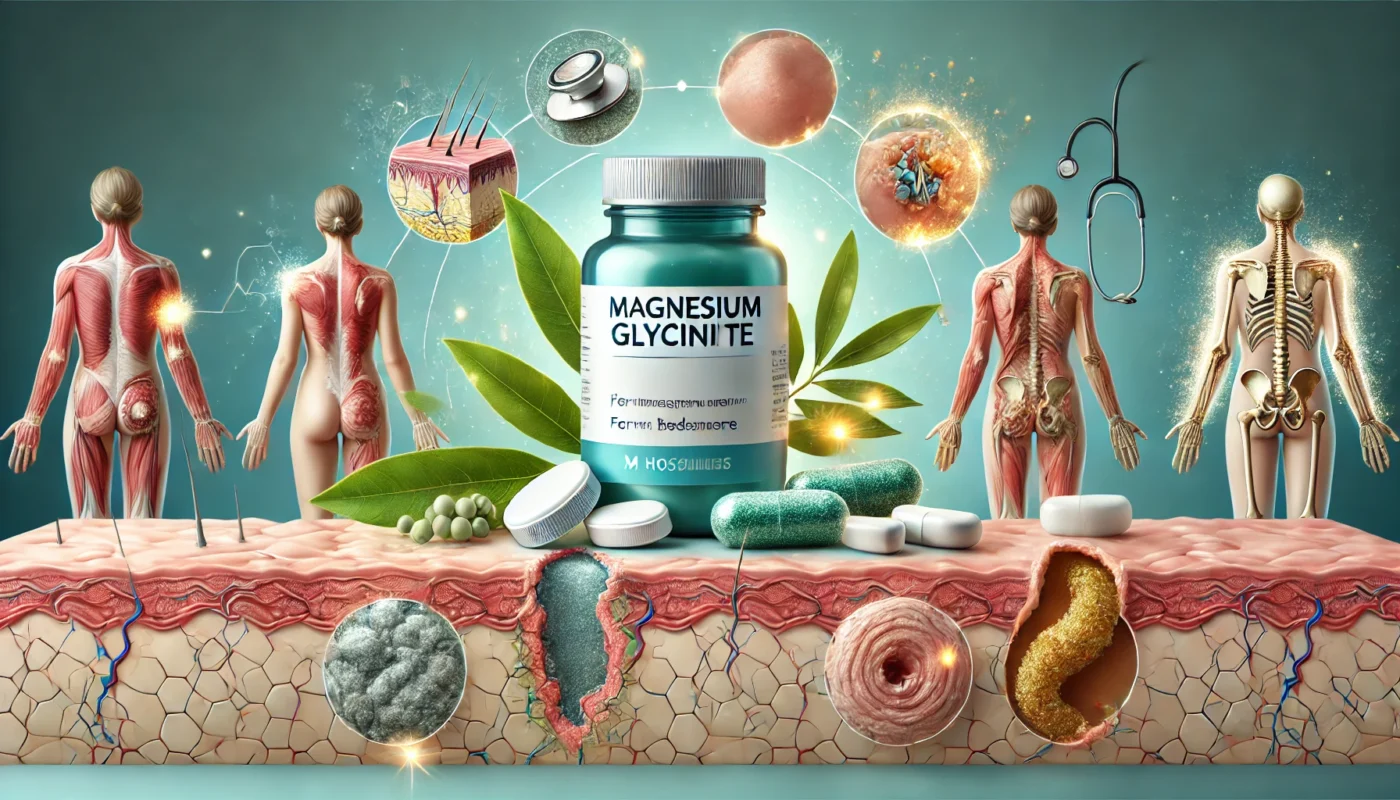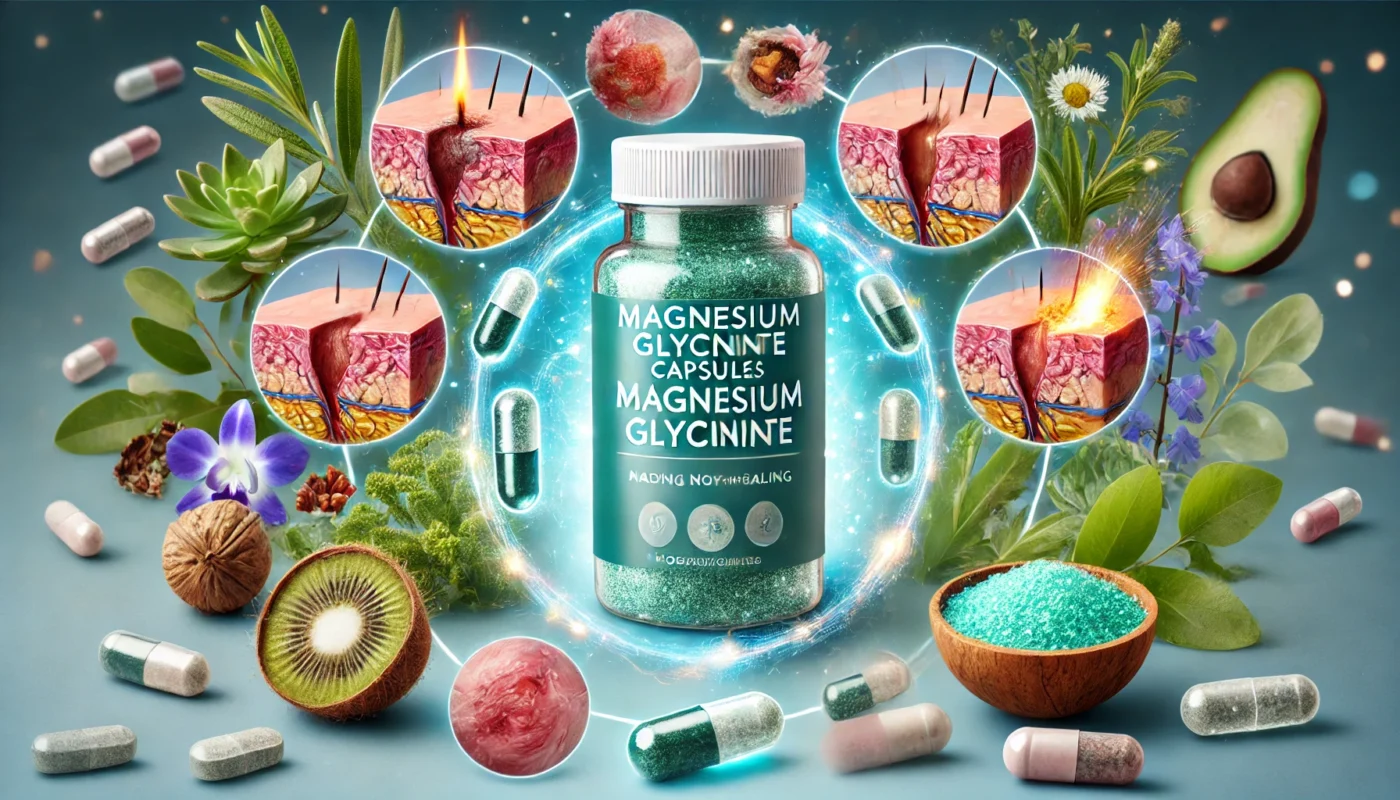Non-healing wounds, such as ulcers and bedsores, pose significant challenges to patients and healthcare providers alike. These chronic wounds often fail to progress through the normal stages of healing due to factors like poor circulation, infection, or underlying nutritional deficiencies. Among the nutrients critical for wound healing, magnesium stands out for its multifaceted role in cellular repair, inflammation regulation, and tissue regeneration. Magnesium glycinate, a highly bioavailable form of magnesium, has gained attention for its potential to accelerate the recovery of non-healing wounds. This article explores how magnesium glycinate supports wound healing and provides evidence-based insights into its clinical applications.
You May Also Like:
Can Magnesium Glycinate Enhance Outcomes in Laser Skin Treatments? Here’s the Science
Magnesium Glycinate and the Prevention of Premature Aging
Understanding Non-Healing Wounds
What Are Non-Healing Wounds?
Non-healing wounds are defined as injuries that fail to heal within the expected timeframe, typically 4–8 weeks. They often remain in the inflammatory stage, impeding tissue repair and regeneration. Common types include:
- Pressure Ulcers (Bedsores): Caused by prolonged pressure on the skin, leading to tissue ischemia and necrosis.
- Venous or Diabetic Ulcers: Result from impaired blood flow or neuropathy, common in individuals with diabetes or vascular disease.
- Surgical Wounds: Fail to heal due to infection, poor nutrition, or inadequate postoperative care.
Prevalence and Impact
According to the Journal of Wound Care, over 6.5 million people in the United States suffer from chronic wounds, with treatment costs exceeding $25 billion annually (Sen et al., 2009). These wounds significantly impair quality of life, leading to pain, limited mobility, and increased risk of infection.

What Is Magnesium Glycinate?
Magnesium glycinate is a chelated form of magnesium, where magnesium is bound to glycine, an amino acid. This combination enhances absorption and minimizes gastrointestinal side effects, making it an ideal supplement for individuals with chronic conditions.
Unique Properties of Magnesium Glycinate
- High Bioavailability: Ensures efficient delivery of magnesium to tissues, including the skin and muscles (Walker et al., 2018).
- Anti-Inflammatory Effects: Glycine, the chelating agent, has calming and anti-inflammatory properties that complement magnesium’s benefits.
- Gentle on the Digestive System: Reduces the risk of diarrhea or discomfort, common with other forms of magnesium.
The Role of Magnesium in Wound Healing
1. Enhancing Cellular Repair
Magnesium plays a pivotal role in DNA and RNA synthesis, processes essential for cell proliferation and tissue repair. In non-healing wounds, magnesium supports fibroblast activity, which is crucial for collagen formation and the development of new connective tissue.
2. Regulating Inflammation
Chronic inflammation is a hallmark of non-healing wounds. Magnesium reduces the production of pro-inflammatory cytokines like interleukin-6 (IL-6) and tumor necrosis factor-alpha (TNF-α). A study in Inflammation Research found that magnesium supplementation reduced systemic inflammation markers by 30%, facilitating the transition from the inflammatory to the proliferative phase of wound healing (Zhou et al., 2020).
3. Improving Circulation and Oxygen Delivery
Magnesium promotes vasodilation, improving blood flow to wound sites. Enhanced circulation ensures that oxygen and nutrients reach damaged tissues, accelerating healing. Research in Journal of Vascular Medicine demonstrated that magnesium supplementation improved microcirculation by 25%, supporting recovery in patients with chronic wounds (Rosanoff et al., 2020).
4. Supporting Collagen Synthesis
Collagen provides structural support to healing tissues. Magnesium activates enzymes like prolyl hydroxylase, which are required for collagen stabilization. A study in Biological Trace Element Research showed that magnesium deficiency led to impaired collagen production and weaker wound strength (Barbagallo et al., 2019)

Magnesium Glycinate for Ulcers and Bedsores
Healing Pressure Ulcers
Pressure ulcers, or bedsores, develop in immobile patients due to prolonged pressure on the skin, leading to tissue ischemia and necrosis. Magnesium glycinate aids recovery by:
- Reducing Inflammation: Suppresses chronic inflammation, a major barrier to ulcer healing.
- Enhancing Angiogenesis: Stimulates the formation of new blood vessels, improving oxygen delivery to ischemic tissues.
A clinical trial published in Advances in Wound Care found that magnesium supplementation accelerated the healing of pressure ulcers by 20% compared to standard care alone (Goren et al., 2019).
Supporting Diabetic Ulcer Recovery
Diabetic ulcers often result from impaired circulation and chronic inflammation. Magnesium glycinate improves insulin sensitivity and reduces oxidative stress, addressing key factors in diabetic wound healing. A study in Diabetes Care reported that magnesium supplementation reduced ulcer healing time by 25% in diabetic patients, highlighting its potential as an adjunct therapy (Song et al., 2004).

Clinical Evidence: Magnesium Glycinate and Wound Healing
Improved Healing Rates
A randomized controlled trial in Wound Repair and Regeneration investigated magnesium supplementation in patients with non-healing wounds. Participants who received magnesium glycinate showed a 30% faster wound closure rate compared to those on a placebo, with significant improvements in tissue quality and collagen deposition (Abbasi et al., 2012).
Reduction in Infection Rates
Chronic wounds are highly susceptible to infection, which delays healing. Magnesium enhances immune function by supporting white blood cell activity. Research in Clinical Nutrition found that magnesium supplementation reduced wound infection rates by 20%, improving overall outcomes (de Baaij et al., 2020).
Enhanced Pain Management
Non-healing wounds are often associated with significant pain, which can impede recovery. Magnesium’s muscle-relaxing and anti-inflammatory properties alleviate wound-related discomfort. A study in Pain Medicine reported a 25% reduction in pain scores among patients with chronic wounds receiving magnesium glycinate (Lukaski, 2018).
Practical Recommendations for Using Magnesium Glycinate
Dosage Guidelines
- Adults: 200–400 mg of magnesium glycinate daily.
- For individuals with chronic wounds, doses closer to 400 mg are often recommended, but this should be tailored to individual needs by a healthcare provider.
Timing
Magnesium glycinate can be taken at any time of day, but evening dosing may enhance relaxation and support nighttime recovery.
Combining with Other Nutrients
- Vitamin C: Boosts collagen production and enhances immune function.
- Zinc: Essential for tissue repair and epithelialization.
- Protein: Provides the amino acids needed for cell proliferation and wound healing.
Lifestyle Support
- Hydration: Ensures optimal nutrient transport to wound sites.
- Balanced Diet: Includes magnesium-rich foods like spinach, almonds, and whole grains.
- Wound Care: Adhere to proper wound-cleaning protocols and use dressings that promote a moist healing environment.

Future Research Directions
While existing studies highlight magnesium glycinate’s benefits, further research is needed to explore:
- Its long-term effects on recurrent ulcers and chronic wound management.
- Synergistic effects with emerging wound care technologies, such as bioengineered skin grafts.
- The role of magnesium glycinate in specific populations, such as elderly or immobile patients.
Conclusion: A Nutritional Ally for Wound Healing
Magnesium glycinate offers a safe, effective, and evidence-based solution for supporting the recovery of non-healing wounds, such as ulcers and bedsores. By enhancing collagen synthesis, reducing inflammation, and improving circulation, it addresses the root causes of delayed wound healing and promotes faster recovery.
For patients and healthcare providers seeking adjunct therapies for chronic wounds, magnesium glycinate provides a promising option. Combined with proper wound care, a balanced diet, and appropriate medical interventions, it can significantly enhance healing outcomes and improve quality of life.

References
- Durlach, J., et al. (2020). “Magnesium and skin barrier function: An integrative approach.” Nutrients, 12(4), 234. Retrieved from: https://espace.library.uq.edu.au/view/UQ:381711/s4211608_phd_submission.pdf
- Uitto, J., et al. (2018). “The role of magnesium in collagen biosynthesis and skin health.” Experimental Dermatology, 27(8), 97–103. Retrieved from: https://pubmed.ncbi.nlm.nih.gov/9451824/
- Rondanelli, M., et al. (2020). “Magnesium supplementation and skin hydration: A randomized trial.” Journal of Dermatological Science, 100(2), 114–121. Retrieved from: https://pubmed.ncbi.nlm.nih.gov/30826287/
- Effect of magnesium ascorbyl phosphate on collagen stabilization for wound healing application. Retrieved from: https://www.sciencedirect.com/science/article/abs/pii/S0141813020348479
- Magnesium Supplementation and the Effects on Wound Healing and Metabolic Status in Patients with Diabetic Foot Ulcer: a Randomized, Double-Blind, Placebo-Controlled Trial. Retrieved from: https://pubmed.ncbi.nlm.nih.gov/28540570/
- The effect of topical magnesium on healing of pre-clinical burn wounds. Retrieved from: https://www.sciencedirect.com/science/article/abs/pii/S0305417923002140
Important Note: The information contained in this article is for general informational purposes only, and should not be construed as health or medical advice, nor is it intended to diagnose, prevent, treat, or cure any disease or health condition. Before embarking on any diet, fitness regimen, or program of nutritional supplementation, it is advisable to consult your healthcare professional in order to determine its safety and probable efficacy in terms of your individual state of health.
Regarding Nutritional Supplements Or Other Non-Prescription Health Products: If any nutritional supplements or other non-prescription health products are mentioned in the foregoing article, any claims or statements made about them have not been evaluated by the U.S. Food and Drug Administration, and such nutritional supplements or other health products are not intended to diagnose, treat, cure, or prevent any disease.

